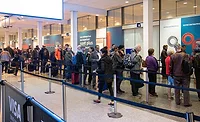Senate Vote Allows TSA to Proceed with Collective Bargaining
The US Senate rejected an amendment that would have blocked Transportation Security Administration employees from having collective-bargaining rights.
The measure would have denied more than 40,000 TSA employees the right to negotiate over topics normally negotiable by federal employees who are represented by unions. Wicker and other supporters of the amendment argued that granting TSA employees full collective-bargaining rights could endanger national security by forcing the agency to negotiate with unions before being allowed to move screeners or change its methods.
Federal employee unions and other opponents of the amendment criticized it as "irresponsible" and urged that granting workers collective-bargaining rights would improve their morale and, in turn, national security.
"There is no place in the federal workforce where there exists a more dire need for collective bargaining than TSA," Colleen M. Kelley, president of the National Treasury Employees Union, said in a statement. "They labor under a system that has almost completely demoralized them, contributing to one of the highest attrition rates in the government, and high on-the-job injuries."
Last November, the Federal Labor Relations Authority announced that TSA personnel would be allowed to vote on whether to have a national bargaining unit. Those votes are scheduled to take place March 9 to April 19.
Earlier this month, TSA administrator John Pistole decided to allow limited collective-bargaining rights for transportation security officers on issues not related to national security.
Looking for a reprint of this article?
From high-res PDFs to custom plaques, order your copy today!







